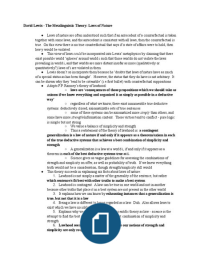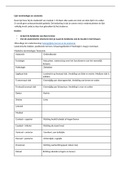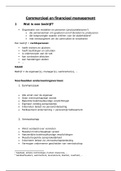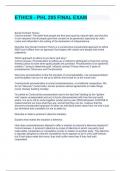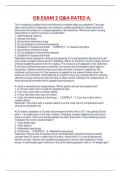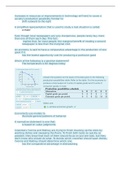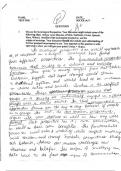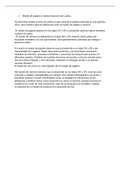David Lewis - The Metalinguistic Theory: Laws of Nature
● Laws of nature are often understood such that if an antecedent of a counterfactual is taken
together with some laws, and the antecedent is consistent with all laws, then the counterfactual is
true. On this view there is no true counterfactual that says if x state of affairs were to hold, then
law y would be violated.
● This view of laws could be incorporated into Lewis’ metaphysics by claiming that there
exist possible world ‘spheres’ around world i such that those worlds do not violate the laws
prevailing in world i, and that worlds are more distant insofar as more (qualitatively or
quantitatively?) laws of i are violated in them.
● Lewis doesn’t so incorporate them because he ‘doubts that laws of nature have as much
of a special status as has been thought’. However, the status that they do have is not arbitrary. It
can be shown why they ‘tend to be cotenable’ (i.e.first bullet) with counterfactual suppositions
● Adopts F.P. Ramsey’s theory of lawhood:
○ laws are ‘consequences of those propositions which we should take as
axioms if we knew everything and organized it as simply as possible in a deductive
way’
○ regardless of what we know, there exist innumerable true deductive
systems: deductively closed, axiomatizable sets of true sentences
○ some of these systems can be axiomatized more simply than others, and
some have more strength/information content. These virtues tend to conflict - pure logic
is simple but not strong
○ We value a balance of simplicity and strength
○ Thus a restatement of the theory of lawhood is: a contingent
generalization is a law of nature if and only if it appears as a theorem/axiom in each
of the true deductive systems that achieves a best combination of simplicity and
strength
○ A generalization is a law at a world i, if and only if it appears as a
theorem in each of the best deductive systems true at i.
○ Science gives us vague guidelines for assessing the combinations of
strength and simplicity on offer, as well as probability of truth. If we knew everything
truth would not be a consideration, though strength/simplicity still would
● This theory succeeds in explaining six facts about laws of nature:
1. Lawhood is not simply a matter of the generality of the sentence, but rather
which sentence/s fit best with other truths to make a best system
2. Lawhood is contingent. A law can be true in one world and not in another
because other truths that place it in a best system are not present in the other world
3. It explains how we can know by exhausting instances that a generalization is
true, but not that it is a law
4. Being a law is different to being regarded as a law. Duh. Also allows laws to
exist which we have no inkling of.
5. Explains why we may take provisional scientific theory as law - science is the
attempt to find the best deductive systems with best combination of simplicity and
strength
6. Lawhood seems a vague concept, because our notions of strength and
simplicity are only roughly fixed
● Laws of nature are often understood such that if an antecedent of a counterfactual is taken
together with some laws, and the antecedent is consistent with all laws, then the counterfactual is
true. On this view there is no true counterfactual that says if x state of affairs were to hold, then
law y would be violated.
● This view of laws could be incorporated into Lewis’ metaphysics by claiming that there
exist possible world ‘spheres’ around world i such that those worlds do not violate the laws
prevailing in world i, and that worlds are more distant insofar as more (qualitatively or
quantitatively?) laws of i are violated in them.
● Lewis doesn’t so incorporate them because he ‘doubts that laws of nature have as much
of a special status as has been thought’. However, the status that they do have is not arbitrary. It
can be shown why they ‘tend to be cotenable’ (i.e.first bullet) with counterfactual suppositions
● Adopts F.P. Ramsey’s theory of lawhood:
○ laws are ‘consequences of those propositions which we should take as
axioms if we knew everything and organized it as simply as possible in a deductive
way’
○ regardless of what we know, there exist innumerable true deductive
systems: deductively closed, axiomatizable sets of true sentences
○ some of these systems can be axiomatized more simply than others, and
some have more strength/information content. These virtues tend to conflict - pure logic
is simple but not strong
○ We value a balance of simplicity and strength
○ Thus a restatement of the theory of lawhood is: a contingent
generalization is a law of nature if and only if it appears as a theorem/axiom in each
of the true deductive systems that achieves a best combination of simplicity and
strength
○ A generalization is a law at a world i, if and only if it appears as a
theorem in each of the best deductive systems true at i.
○ Science gives us vague guidelines for assessing the combinations of
strength and simplicity on offer, as well as probability of truth. If we knew everything
truth would not be a consideration, though strength/simplicity still would
● This theory succeeds in explaining six facts about laws of nature:
1. Lawhood is not simply a matter of the generality of the sentence, but rather
which sentence/s fit best with other truths to make a best system
2. Lawhood is contingent. A law can be true in one world and not in another
because other truths that place it in a best system are not present in the other world
3. It explains how we can know by exhausting instances that a generalization is
true, but not that it is a law
4. Being a law is different to being regarded as a law. Duh. Also allows laws to
exist which we have no inkling of.
5. Explains why we may take provisional scientific theory as law - science is the
attempt to find the best deductive systems with best combination of simplicity and
strength
6. Lawhood seems a vague concept, because our notions of strength and
simplicity are only roughly fixed

